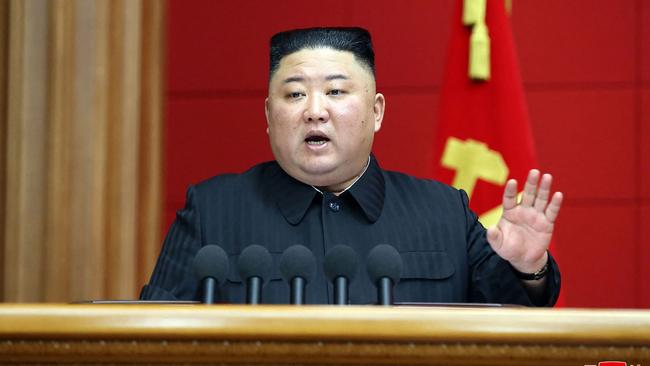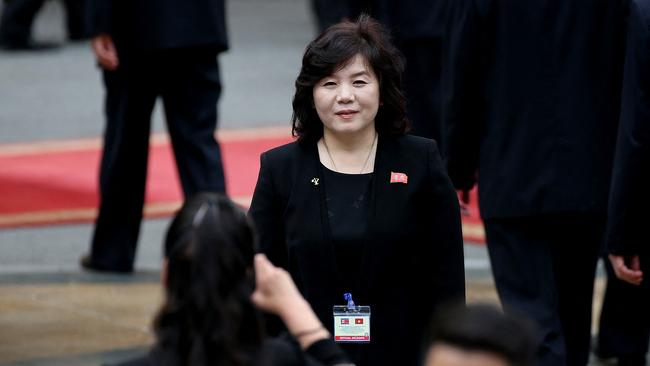Hitting nerve with Kim Jong-un regime takes just a few words
Antony Blinken used the phrase the ‘denuclearisation of North Korea’. Pyongyang called the words part of a ‘lunatic theory’.

In nuclear diplomacy between the US and North Korea, changing just two words can elicit a big response.
Secretary of State Antony Blinken and Defence Secretary Lloyd Austin during this week’s visit to Tokyo and Seoul used the phrase the “denuclearisation of North Korea”, mirroring language used by Biden administration officials in recent weeks to describe the ultimate goal of peace talks with the Kim Jong-un regime.
That varied subtly from language used by past US administrations, and included in 2018’s Singapore accord reached between the Trump administration and Pyongyang, when the objective was phrased as the “denuclearisation of the Korean Peninsula”. It didn’t take long for Washington’s rhetorical shift to hit Pyongyang’s radar. In a Thursday statement by one of Pyongyang’s top diplomats, the Kim regime rebuffed the Biden administration’s recent overtures for low-level talks and decried “groundless rhetoric” that she said pigeonholed the issue as being a threat from North Korea.
“What has been heard from the US since the emergence of the new regime is only lunatic theory,” said Choe Son-hui, Pyongyang’s first vice-minister of foreign affairs and a frequent interlocutor with Washington.
The change in word choice appears to signify more a shift in style than substance. It recognises that the Kim regime is the only side with nuclear weapons on the Korean peninsula.
The Biden administration’s policy review for North Korea is still weeks from completion. But the new phrasing squarely acknowledges a painful reality following decades of failed negotiations between the US and North Korea: The two sides working off the same definition for disarmament have pursued vastly different paths and goals.
The broader phrasing is problematic, because it gives North Korea the ability to craft any number of definitions for denuclearisation, said Jean H. Lee, director of the Korea program at the Wilson Centre, a nonpartisan think tank in Washington.
“Every word matters, and this is the Biden administration seeking to get the wording right,” Ms Lee said.
The stated ideal of denuclearising the Korean Peninsula dates back to at least 1992, when the two Koreas signed a joint non-proliferation declaration. The dual pledge, even back then, was about optics: South Korea had no nuclear program, while the US had removed its own missiles from the country the prior year.

When nuclear talks with Washington and Pyongyang unfolded in the early 1990s, US negotiators saw the language of reciprocity as a mild concession to a small, yet proud country that sought more equal terms in any deal, said Daniel Russel, the former top State Department official for Asia during the Obama administration, who was involved in those talks.
“We felt it was appropriate and productive for the US to go the extra mile, demonstrating to the North Koreans we weren’t out to get them,” said Mr Russel, who is now vice-president of the Asia Society Policy Institute.
Over the decades, the US has accepted a more literal interpretation of denuclearisation of the Korean Peninsula: Pyongyang gives up its missiles, Seoul agrees to never develop or accept them and Washington vows to not redeploy.
But in more recent years, North Korea began contorting — and redefining — what denuclearisation to the peninsula might mean, expanding its demands beyond dispelling a nuclear threat from the other side.
Now Pyongyang contends denuclearisation on the Korean Peninsula means Washington drops its “hostile policy” toward the Kim regime. That list of demands encompasses military exercises, American troops stationed in South Korea and even the US security ring across the Pacific.
“This is North Korea’s strategy: They keep moving the conversation window more and more in their favour,” said Markus Garlauskas, a former US intelligence official and current senior fellow at the Atlantic Council.
The mismatch in expectation helps explain why multiple North Korean disarmament deals have broken down. The definitional disconnect became acute after the Singapore summit, when Kim and former president Donald Trump hashed out a deal that pledged to work toward the “complete denuclearisation of the Korean Peninsula”. In the following weeks, senior Trump officials, including then-secretary of State Mike Pompeo, described the accord as striving for the “final, fully verified denuclearisation of North Korea as agreed to by Chairman Kim Jong-un.” This enraged Pyongyang, which hurled insults at Mr Pompeo and accused the Trump administration of making a one-sided, “gangster-like demand for denuclearisation”. Formal talks broke off in October 2019 and haven’t been rekindled since.
Mr Biden, even before his November election victory, signalled that he would view North Korean talks differently and criticised Mr Trump’s unconditional meetings with Kim. In a column published by South Korea’s semi-official news agency in late October, Mr Biden refrained from mirroring the language in the Singapore accord.
“I’ll engage in principled diplomacy and keep pressing toward a denuclearised North Korea and a unified Korean Peninsula,” Mr Biden wrote.
Asked if Mr Biden would be open to meeting Kim, Mr Blinken told a group of young South Korean journalists on Thursday that the US was looking at everything.
“The goal is to really figure out how we have the best chance in resolving the challenges posed by North Korea to us and unfortunately to its own people,” Mr Blinken said. “And in a sense, everything is on the table.” The Biden administration has reached out to the Kim regime by phone and email in recent weeks, though Pyongyang has rebuffed such outreach, according to North Korea’s state media.
The more direct description of the North Korean nuclear issue by US officials presents Pyongyang as the problem, said Philip W. Yun, a former State Department official who travelled to Pyongyang in the late 1990s for senior negotiations.
“It’s just going to make things more difficult,” Mr Yun said.
The Wall Street Journal



To join the conversation, please log in. Don't have an account? Register
Join the conversation, you are commenting as Logout